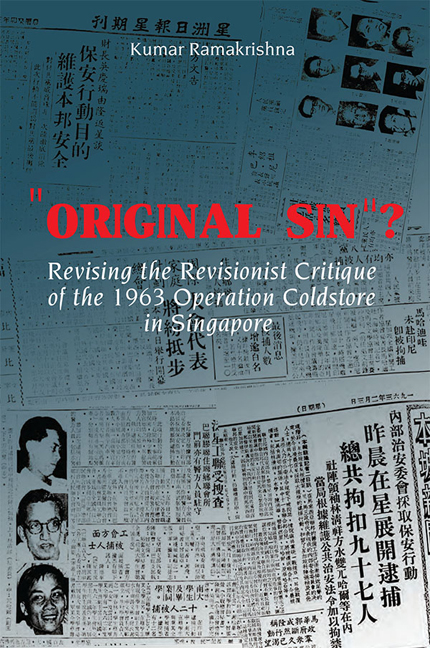Book contents
- Frontmatter
- Contents
- Acknowledgements
- Introduction: The “Alternate” Challenge to the Singapore Story as Context
- 1 Government Sources: Who Uses Them, and the Alternates’ Unarticulated Ideological Outlook
- 2 Was there Really a Dangerous Communist United Front?
- 3 The Curious Case of Lim Chin Siong
- 4 Why “Was Operation Coldstore Driven by Political and Not Security Grounds?” is the Wrong Question
- Conclusion: The Enduring Need for a Singapore Story 2.0
- Bibliography
- Index
- About the Author
4 - Why “Was Operation Coldstore Driven by Political and Not Security Grounds?” is the Wrong Question
Published online by Cambridge University Press: 19 May 2017
- Frontmatter
- Contents
- Acknowledgements
- Introduction: The “Alternate” Challenge to the Singapore Story as Context
- 1 Government Sources: Who Uses Them, and the Alternates’ Unarticulated Ideological Outlook
- 2 Was there Really a Dangerous Communist United Front?
- 3 The Curious Case of Lim Chin Siong
- 4 Why “Was Operation Coldstore Driven by Political and Not Security Grounds?” is the Wrong Question
- Conclusion: The Enduring Need for a Singapore Story 2.0
- Bibliography
- Index
- About the Author
Summary
THE ALTERNATES’ “POLITICS-AND-NOT-SECURITY” ARGUMENT
To recapitulate, the Alternate claim is that Coldstore was an exercise that could not be justified on standard security grounds, for several reasons. First, the threat was exaggerated: while there certainly was an anti-colonial Progressive Left movement in Singapore in the 1950s to early 1960s, and it at times turned violent as in the Hock Lee incident of mid-1955 for example, this was not necessarily a movement that was closely manipulated by the CPM behind the scenes. In short, it was not a Communist United Front (CUF) in the traditional sense of the term. As the former leftist Dominic Puthucheary put it, there was “a movement with a wide range of political views from extreme left to social democratic right which attempted to create an alternative to a colonially-designed society, an embryo for creating a new Malaya”. The Alternates make great capital of a contemporary analysis in April 1962 by the Security Liaison Officer (the MI5 representative) in Singapore, Maurice L.B. Williams, who was sceptical of a Singapore Special Branch analysis of the threat:
It is far more likely (as was envisaged by the Party themselves in the October Resolutions of 1951) that the “United Front” represents an amalgam of different and conflicting interests, individual ambitions, industrial grievances, Chinese nationalism, housing problems of the peasant population and educational frustration of the students. At present they are united only in their dissatisfactions with the P.A.P. Government, and they cannot be considered to form a monolithic Communist edifice under strict Party management…
Related to this perspective is the view that the CPM as a whole was by 1963 heavily weakened due to arrests and hence its “influence on the radical politics of Singapore in the late 1950s and early 1960s was, if anything, weaker than it had been between 1945 and 1951”.
Second, the British felt constrained by the fact that they could only agree to any arrest programme if there was clear evidence that Lim Chin Siong and company were about to depart from the constitutional path to embark on violent action. In his April 1962 threat assessment, SLO Maurice Williams had dismissed any notion of evidence of such a Communist conspiracy.
Information
- Type
- Chapter
- Information
- Original Sin?Revising the Revisionist Critique of the 1963 Operation Coldstore in Singapore, pp. 84 - 119Publisher: ISEAS–Yusof Ishak InstitutePrint publication year: 2015
